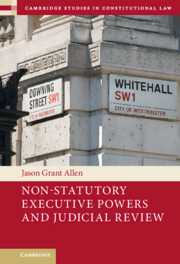Book contents
- Non-Statutory Executive Powers and Judicial Review
- Cambridge Studies in Constitutional Law
- Non-Statutory Executive Powers and Judicial Review
- Copyright page
- Dedication
- Contents
- Acknowledgements
- Table of Cases
- 1 Introduction
- 2 Official Action beyond Statute
- 3 The ‘Third Source’ in the Courts
- 4 A Unified Category of ‘Non-Statutory Executive Powers’
- 5 The Crown as Corporation
- 6 Public Law as the Law of Public Offices
- 7 Office in Action
- 8 Approaching Judicial Review
- 9 Competence, Conduct, and Validity
- 10 Moving beyond the Ultra Vires Debate
- 11 The Common Law Theory of Ultra Vires
- 12 The Borders of the Supervisory Jurisdiction
- 13 The Normative Foundations of Judicial Review
- Index
13 - The Normative Foundations of Judicial Review
Published online by Cambridge University Press: 18 August 2022
- Non-Statutory Executive Powers and Judicial Review
- Cambridge Studies in Constitutional Law
- Non-Statutory Executive Powers and Judicial Review
- Copyright page
- Dedication
- Contents
- Acknowledgements
- Table of Cases
- 1 Introduction
- 2 Official Action beyond Statute
- 3 The ‘Third Source’ in the Courts
- 4 A Unified Category of ‘Non-Statutory Executive Powers’
- 5 The Crown as Corporation
- 6 Public Law as the Law of Public Offices
- 7 Office in Action
- 8 Approaching Judicial Review
- 9 Competence, Conduct, and Validity
- 10 Moving beyond the Ultra Vires Debate
- 11 The Common Law Theory of Ultra Vires
- 12 The Borders of the Supervisory Jurisdiction
- 13 The Normative Foundations of Judicial Review
- Index
Summary
This chapter explores the normative foundations of judicial review by rounding back on the concept of office. Judicial review exists to ensure that repositories of official power act only within the scope of the powers reposed in them. Official ‘power’ is inherently limited in virtue of being translated into official ‘powers’ (i.e., vires) that are implicitly capable of judicial interpretation and enforcement. The same applies for the constrains (i.e., rules of conduct) that operate on the manner, form, and purpose of their exercise. This gives rise to a concept of the rule of law as the rule of officials acting lawfully, which is a powerful expression of the ‘rule of law, not of men’ strand of thinking that traces back to Bracton at least. Office provides a superior point of departure than the radical English notion of parliamentary soveriegnty. This makes an appropriate concept of ‘public trust’ or ‘public fiduciary law’ the best expression of the conceptual and normative basis of judicial review. Far from being a slipshod translant of private law fiduciary remedies into public law, the emerging idea of ‘public fiduciary law’ is an apt expression of the deeper logic of office.
Keywords
- Type
- Chapter
- Information
- Non-Statutory Executive Powers and Judicial Review , pp. 305 - 329Publisher: Cambridge University PressPrint publication year: 2022

